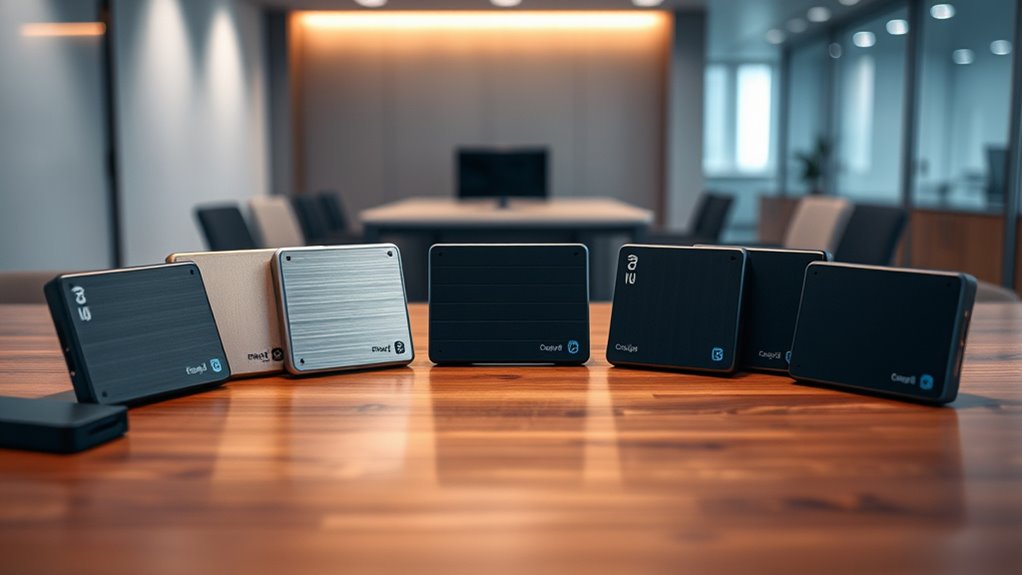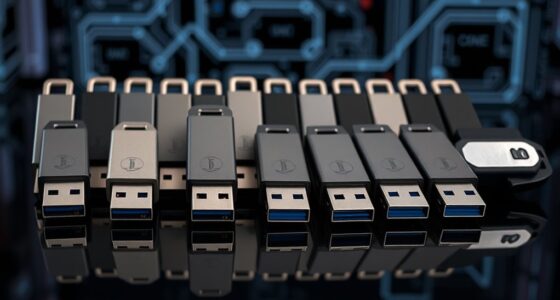If you’re looking for reliable FIPS-validated external SSDs for secure data storage in 2025, I recommend considering options like the Samsung T7 Shield, SanDisk Extreme Portable SSD, Lexar ES3, and Western Digital P40 Game Drive. These drives offer high transfer speeds, robust security features, impact resistance, and broad compatibility. Choosing the right one depends on your durability needs and device compatibility. Keep exploring, and I’ll show you more options tailored for your security needs.
Key Takeaways
- Focus on SSDs with FIPS 140-2/3 validation, hardware encryption, and secure key management for compliance and data security.
- Prioritize models with transfer speeds ≥1,000MB/s to handle encryption overhead efficiently.
- Choose rugged, impact-resistant drives with water and dust resistance for durability in harsh environments.
- Ensure compatibility with multiple OS, interfaces (USB-C, USB-A, Thunderbolt), and secure protocols for versatile deployment.
- Consider warranty, manufacturer support, and firmware updates to maintain security standards and device longevity in 2025.
SAMSUNG T7 Portable SSD 1TB External Solid State Drive
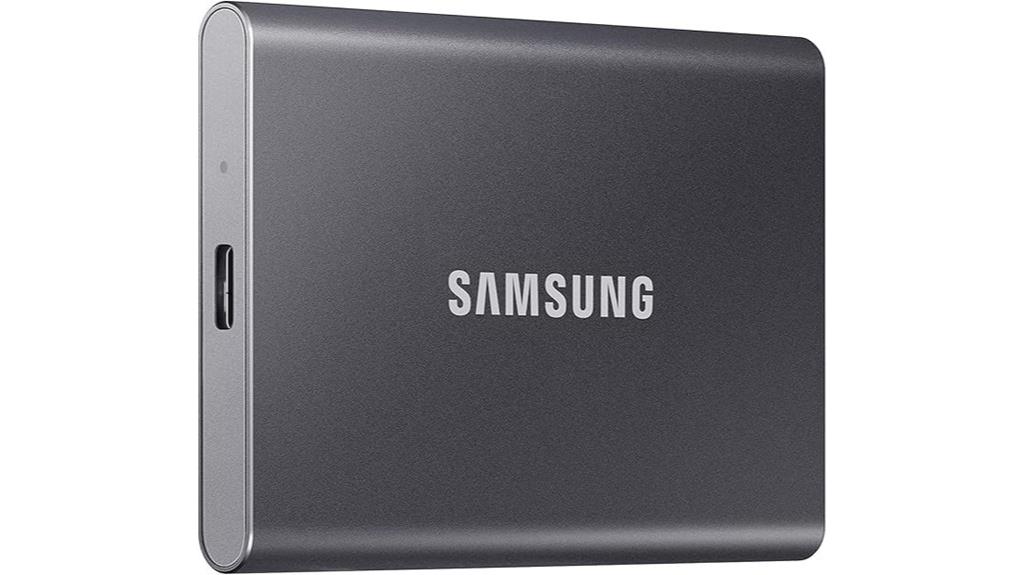
If you’re looking for a secure, reliable external SSD that’s perfect for creators, students, or professionals on the go, the Samsung T7 Portable SSD 1TB stands out. It offers 1TB of fast, portable storage with options up to 4TB, ideal for large files and backups. Its PCIe NVMe technology provides speeds up to 1,050 MB/s, making file transfers quick and efficient. Built with a durable aluminum body, it’s shock-resistant and can withstand falls up to 6 feet. Compatibility with various devices, including phones and cameras, makes it versatile for high-resolution video recording and demanding applications.
Best For: creators, students, and professionals needing fast, reliable portable storage for large files, video editing, and backups.
Pros:
- Fast read/write speeds up to 1,050/1,000 MB/s for quick file transfers
- Durable aluminum unibody construction with shock resistance and fall protection up to 6 feet
- Compatible with a wide range of devices including PCs, mobile phones, and cameras
Cons:
- May be more expensive than traditional HDD options
- Limited to 1TB default capacity (up to 4TB available) which might not suffice for extremely large data needs
- Requires compatible USB-C port for optimal performance, possibly necessitating adapters for some devices
SanDisk 1TB Extreme Portable SSD (SDSSDE61-1T00-G25)
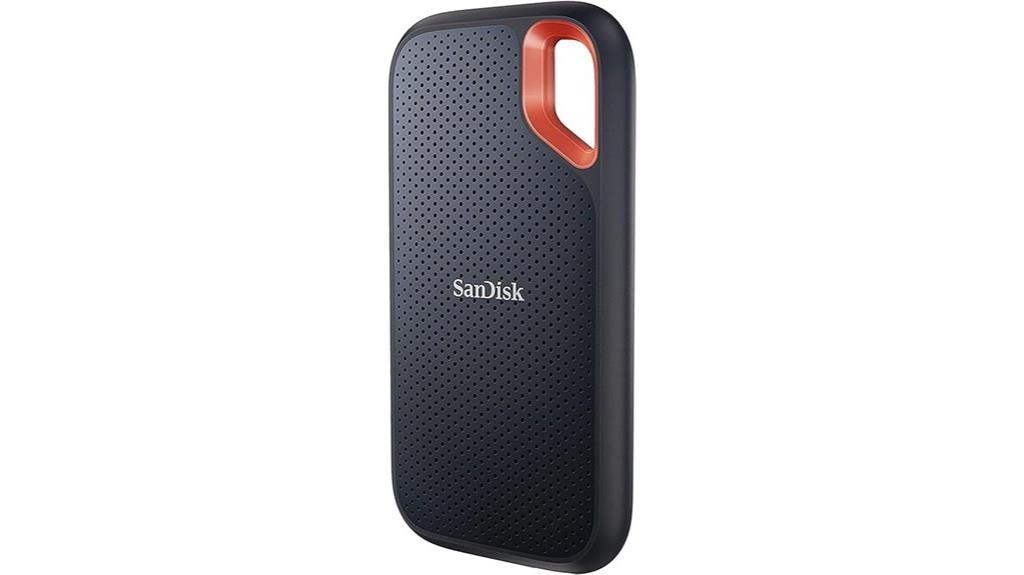
The SanDisk 1TB Extreme Portable SSD stands out for users who need a rugged, high-speed external drive with advanced security features. It delivers NVMe speeds up to 1050MB/s read and 1000MB/s write, making large file transfers and backups swift. Designed with durability in mind, it’s IP65 water and dust resistant and can withstand drops from up to 3 meters. The drive offers 256-bit AES hardware encryption for secure data protection and connects via USB 3.2 Gen 2 and USB-C. Its compact, lightweight design, along with included carabiner, makes it perfect for travel. Reliability is backed by a 5-year warranty and positive user reviews.
Best For: users needing a rugged, high-speed external SSD for fast file transfers, media backups, and secure data storage in outdoor or mobile environments.
Pros:
- Exceptional NVMe speeds up to 1050MB/s read and 1000MB/s write for rapid data transfer
- Durable IP65 water and dust resistance with drop protection up to 3 meters, ideal for rugged use
- Secure 256-bit AES hardware encryption and compatibility with Windows and Mac for data safety
Cons:
- Write speeds for large files can decline to around 438MB/s when the drive is nearly full or heavily used
- Lacks internal DRAM cache, which may impact sustained write performance over time
- Synthetic benchmarks may overstate real-world transfer speeds, requiring actual file testing for accurate performance assessment
SSK 1TB External SSD Drive with USB 3.2 Gen2X2
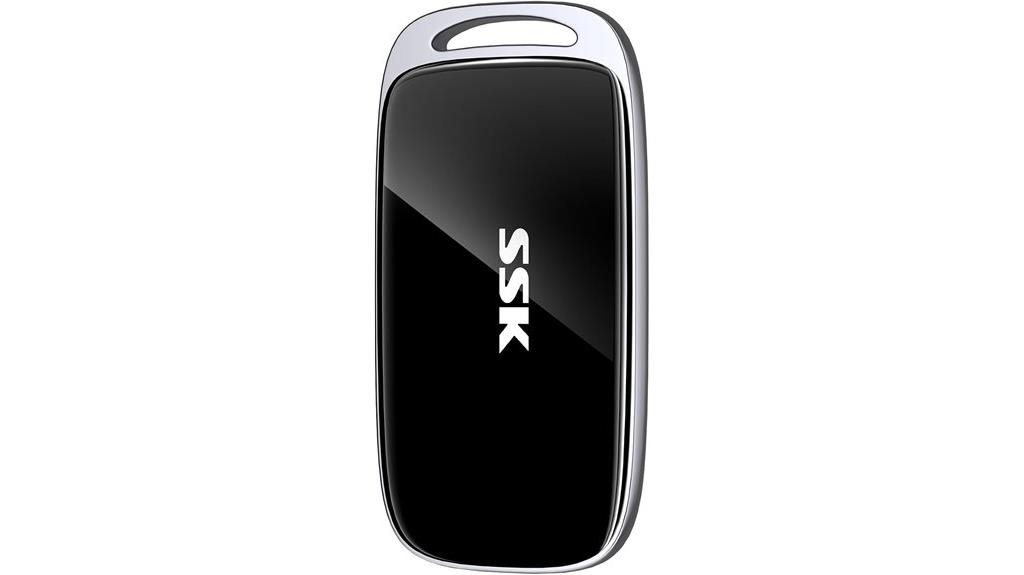
For professionals seeking rapid data transfer combined with robust security, the SSK 1TB External SSD Drive with USB 3.2 Gen2X2 stands out as an ideal choice. It delivers blazing 20Gbps transfer speeds, enabling instant file viewing and editing. Compatible with most USB devices via USB-C and USB-A cables, it supports cross-platform use, including phones and gaming consoles. Its Zinc Alloy case ensures better heat dissipation and durability. With features like S.M.A.R.T. diagnostics, adaptive TRIM, and an LED activity indicator, it maintains performance and data integrity. Supporting full 1TB storage, it’s perfect for on-the-go professionals needing fast, secure, and reliable storage.
Best For: professionals and power users who require ultra-fast data transfer, robust security, and reliable portable storage for editing and managing large files on the go.
Pros:
- Blazing 20Gbps transfer speed with up to 2000MB/s read/write performance for instant file access.
- Universal compatibility via USB 3.2 Gen2x2, supporting cross-platform use with USB-C and USB-A cables.
- Durable Zinc Alloy casing with enhanced heat dissipation and built-in data security features like S.M.A.R.T. diagnostics and adaptive TRIM.
Cons:
- Requires USB 3.2 Gen2x2 port for full speed; older or lower-speed ports will limit performance.
- Slightly higher cost compared to traditional external drives due to advanced features and materials.
- Limited to 1TB capacity, which may not be sufficient for users needing larger storage options.
Lexar ES3 1TB External SSD (USB 3.2 Gen2)

The Lexar ES3 1TB External SSD stands out as an excellent choice for users seeking fast, secure storage, thanks to its USB 3.2 Gen 2 interface supporting read speeds up to 1050MB/s. It’s compatible with a wide range of devices, including iPhone 15, Macs, Windows PCs, cameras, and gaming consoles like PS5 and Xbox Series X|S. Its lightweight, slim metal design makes it perfect for portability, while Lexar’s DataShield software provides 256-bit AES encryption for added security. With reliable performance across various systems and a solid customer rating, the ES3 offers a compelling combination of speed, security, and convenience.
Best For: users seeking fast, portable, and secure external storage compatible with a wide range of devices including smartphones, laptops, and gaming consoles.
Pros:
- Supports high-speed transfer with up to 1050MB/s read and 1000MB/s write speeds
- Compact, lightweight, and durable metal design for portability
- Includes Lexar DataShield 256-bit AES encryption for enhanced data security
Cons:
- Not compatible with iPhone 14 or earlier models (only supports iPhone 15)
- Uses USB 3.0 interface (backward compatible but not the latest USB standard)
- Magsafe support is not available for seamless Apple device integration
SanDisk 1TB Portable SSD

If you need a reliable external SSD that combines high-speed performance with rugged durability, the SanDisk 1TB Portable SSD is an excellent choice. It delivers up to 800MB/s read speeds, enabling quick data transfers. Its compact design makes it perfect for mobile use, supporting your on-the-go data needs. Built to withstand drops from up to two meters, it’s tough enough for outdoor adventures and travel. The included rubber hook adds secure attachment to belts or backpacks, enhancing portability. Trusted by professionals, SanDisk guarantees quality and reliability, making this drive ideal for safeguarding valuable data in demanding environments.
Best For: professionals and outdoor enthusiasts seeking a durable, high-speed external SSD for on-the-go data transfer and secure storage.
Pros:
- Fast transfer speeds of up to 800MB/s for quick data handling
- Durable design withstands drops from up to two meters
- Portable with a secure rubber hook for easy attachment to gear
Cons:
- Performance may vary depending on host device and usage conditions
- Limited to 1TB storage capacity, which may not suit very large data needs
- Requires compatible USB-C or USB 3.2 Gen 2 ports for optimal performance
BUFFALO External SSD 1TB for PS4, PS5, Windows, Mac
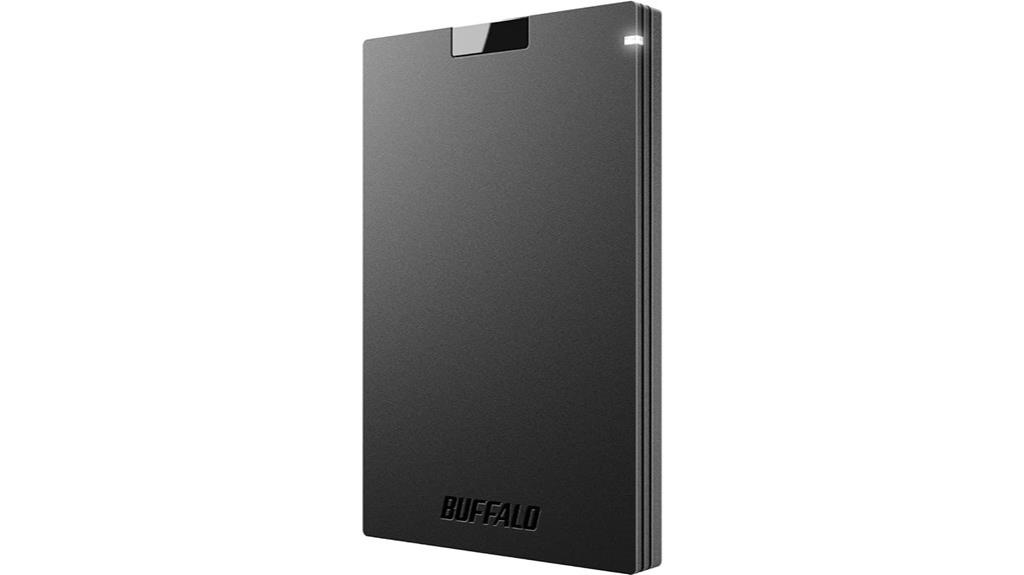
Buffalo’s External SSD 1TB stands out as an excellent option for gamers and professionals who need fast, portable storage across multiple platforms. It’s compatible with PS4, PS5, Windows, and Mac, supporting USB 3.2 via USB-C and USB-A for quick data transfers. Its compact design (4.6 x 3 x 0.5 inches) makes it easy to carry, perfect for gaming, backups, or editing large files. With speeds over 350MB/s and rugged, shock-resistant casing, it stays cool during intensive use. While some users report high temperatures, adding heat sinks can help. Overall, it’s a reliable, versatile drive for on-the-go storage needs.
Best For: gamers and professionals seeking fast, portable external SSD storage compatible with multiple devices including PS4, PS5, Windows, and Mac.
Pros:
- Supports USB 3.2 with USB-C and USB-A interfaces for fast data transfer speeds exceeding 350MB/s
- Compact, lightweight design (4.6 x 3 x 0.5 inches) ideal for on-the-go use and easy to carry in pockets or backpacks
- Rugged, shock-resistant casing that stays cool during intensive tasks and provides durability for travel
Cons:
- Some units may run hot during transfers, reaching temperatures up to 83°C, potentially affecting longevity without added heat sinks
- USB connector can be fragile, and the plastic build may be prone to damage if not handled carefully
- Occasional compatibility issues or device disconnections reported, especially with certain PS5 models or during high-speed data transfers
Western Digital 1TB P40 Game Drive SSD
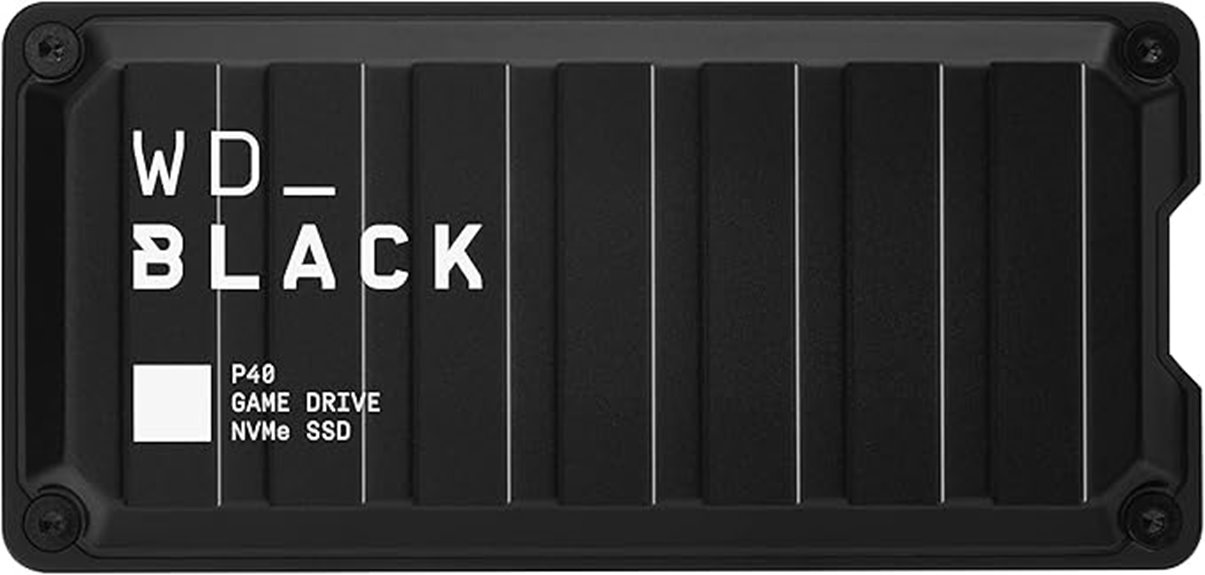
Looking for a high-performance external SSD that combines speed, durability, and sleek design? The Western Digital 1TB P40 Game Drive SSD delivers up to 2,000MB/s via USB 3.2 Gen2x2, making it perfect for gaming, backup, and large file transfers. Its shock-resistant build survives drops up to two meters, and the compact design fits easily into any setup. With customizable RGB lighting on Windows and broad compatibility across PlayStation, Xbox, PC, and Mac, it’s versatile and stylish. While speeds sometimes hover around 900MB/s, it remains a reliable choice for fast, portable storage. Its durability and sleek aesthetics make it a favorite among gamers and professionals alike.
Best For: gamers, content creators, and professionals needing fast, portable external storage for gaming, media, and large files.
Pros:
- Speeds up to 2,000MB/s for rapid game loading and data transfer
- Rugged, shock-resistant design ensures durability during transport
- Sleek, customizable RGB lighting adds aesthetic appeal and personalization
Cons:
- Slightly below advertised speeds, averaging around 900MB/s in some cases
- Overheating during extensive file transfers may require additional cooling solutions
- Requires formatting adjustments (e.g., NTFS or APFS) depending on the platform for optimal use
SanDisk 1TB Portable SSD
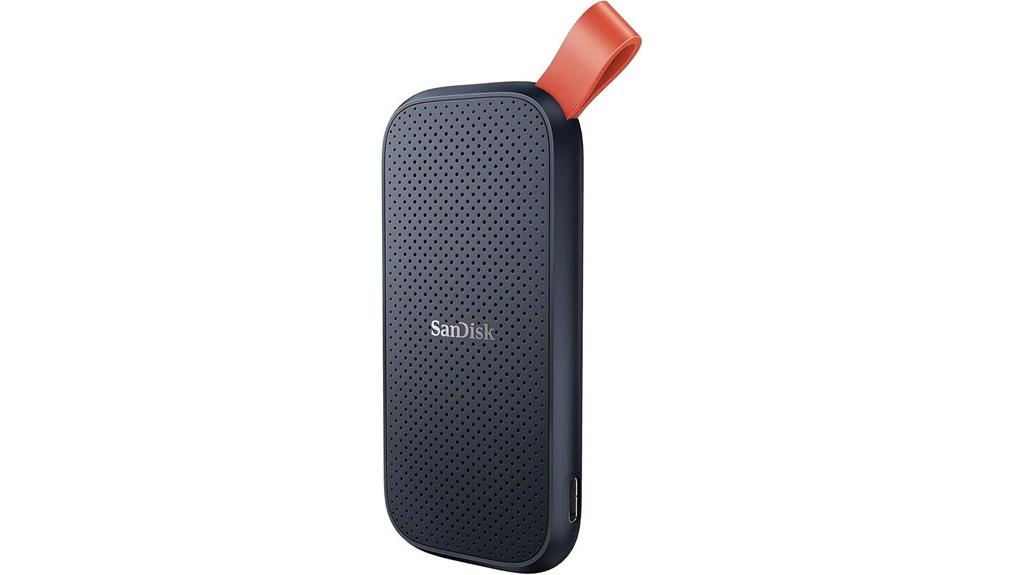
The SanDisk 1TB Portable SSD is an excellent choice for professionals and on-the-go users who need reliable, high-speed data transfer in a compact package. With read speeds up to 520MB/s, it handles large files, photos, videos, and backups efficiently. Its durable design withstands drops from up to two meters, ensuring it remains reliable during travel. The tough rubber hook allows secure attachment to belts or backpacks, enhancing portability. Compatible with USB-C and USB 3.2 Gen 2 interfaces, it offers broad device support. Trusted for its quality, SanDisk delivers a dependable, high-performance portable storage solution perfect for mobile lifestyles and demanding workflows.
Best For: professionals, photographers, and on-the-go users who require fast, reliable portable storage for large files and demanding workflows.
Pros:
- High read speeds up to 520MB/s for quick data transfer
- Durable design withstands drops up to two meters, enhancing reliability
- Compact, lightweight with a secure rubber hook for easy portability
Cons:
- Performance may vary depending on host device and usage conditions
- Limited to USB-C and USB 3.2 Gen 2 interfaces, which may require adapters for some devices
- No built-in hardware encryption for added security
Factors to Consider When Choosing Fips‑Validated External SSDS
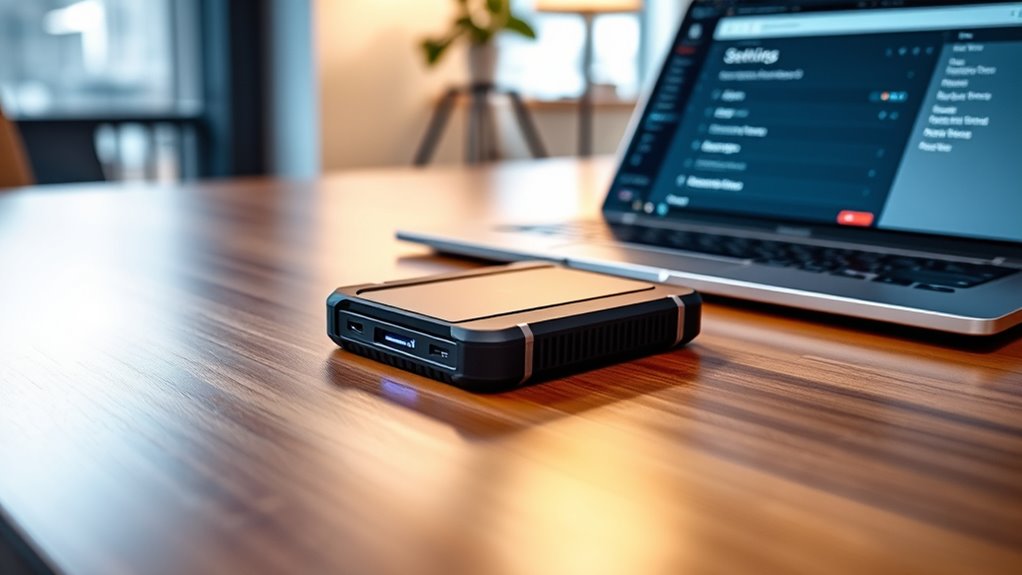
When selecting a FIPS-validated external SSD, I focus on several key factors to guarantee I get the right device. I consider compliance standards, security features, transfer speeds, durability, and compatibility to meet my specific needs. Understanding these points helps me make an informed decision for secure and reliable data storage.
Compliance Standards
Choosing a FIPS-validated external SSD requires careful consideration of compliance standards because not all drives meet the rigorous security requirements set by federal agencies. FIPS validation confirms that the device adheres to strict standards like FIPS 140-2 or FIPS 140-3, which involve thorough testing of encryption algorithms, security architecture, and operational environments. These standards ensure hardware-based encryption and secure key management, essential for safeguarding sensitive data. It’s vital to verify a drive’s certification status, as not every external SSD on the market is FIPS-validated. For organizations handling sensitive information, compliance isn’t just a checkbox—it’s a necessity for regulatory adherence and trusted data protection. Making sure the drive meets these standards helps mitigate risks and guarantees adherence to federal security protocols.
Security Features
Security features are crucial factors to evaluate when selecting a FIPS-validated external SSD, as they directly impact the device’s ability to protect sensitive data. These SSDs incorporate 256-bit AES hardware encryption, ensuring robust protection that meets strict government standards. They typically support secure key management, authentication, and automatic data encryption, preventing unauthorized access. FIPS validation confirms that the encryption modules adhere to rigorous federal cryptographic standards, giving you confidence in their security. Many models also include advanced features like self-destruct mechanisms and tamper-evident designs, which help safeguard data against physical intrusion or tampering. Compatibility with FIPS-validated hardware ensures data remains secure during transfer, storage, and access across compliant systems. These features collectively provide a thorough security framework essential for sensitive information.
Transfer Speeds
High transfer speeds are vital to getting the most out of a FIPS-validated external SSD, especially when handling large or multiple files. To guarantee secure and efficient data transfer, look for drives with speeds of 1,000 MB/s or more. These speeds help maintain high encryption performance without slowing down your workflow. In real-world use, many FIPS-validated SSDs deliver transfer rates between 400 and 1,200 MB/s, keeping encryption overhead minimal. When choosing an SSD, verify that its hardware or software encryption can sustain your required transfer speeds without causing bottlenecks. Faster speeds reduce the time data spends in encryption or decryption, boosting productivity and minimizing potential security risks during data transfer. Prioritizing transfer speed ensures your secure storage solution is both fast and reliable.
Durability & Build
When selecting a FIPS-validated external SSD, durability and build quality are crucial considerations, especially for demanding environments. These drives are crafted with rugged, impact-resistant enclosures that can withstand shocks and drops, thanks to shock-proof and drop-proof designs. They typically use tough materials like aluminum or reinforced plastics, which bolster structural integrity and safeguard internal components. Many models are engineered to endure environmental stresses such as dust, water, and temperature fluctuations, ensuring reliable performance in harsh conditions. Their sealed or semi-sealed cases prevent dust and moisture ingress, maintaining data integrity. This focus on robustness and longevity makes these SSDs ideal for military, government, and security-sensitive applications where durability isn’t just a feature—it’s essential.
Compatibility Options
Choosing a FIPS-validated external SSD requires careful attention to compatibility to guarantee smooth integration with your devices. First, verify the drive supports FIPS-140-2 or FIPS-197 standards for encryption validation. Then, confirm that it works seamlessly with your operating system—Windows, macOS, or Linux—to avoid connectivity issues. Check if the SSD offers multiple connection interfaces like USB-C, USB-A, or Thunderbolt, matching your device’s ports. Confirm that it aligns with your hardware specifications, including supported protocols and power requirements, to prevent performance problems. Additionally, consider cross-platform support, which allows secure data transfer across different operating systems. Taking these factors into account will ensure you select a compatible, reliable drive that fits your workflow and security needs.
Warranty & Support
A solid warranty and dependable support are crucial factors when selecting a FIPS-validated external SSD, as they guarantee you’re covered if issues arise. Look for products with at least a 3-5 year warranty to protect against defects or failures. Make sure the manufacturer offers accessible support channels—phone, email, or live chat—for quick assistance when needed. Regular firmware updates are essential, as they can improve security and ensure continued FIPS compliance. Additionally, research the manufacturer’s reputation for reliability and responsiveness, especially in resolving security or performance problems. Finally, review the product documentation carefully to ensure it clearly details security features and support policies related to FIPS validation, giving you confidence your data remains protected and supported throughout its lifecycle.
Frequently Asked Questions
Are Fips-Validated SSDS Compatible With All Operating Systems?
FIPS-validated SSDs are generally compatible with most major operating systems like Windows, macOS, and Linux. However, I recommend checking the specific device’s specifications because some features or encryption methods might require additional drivers or software. I always guarantee my system supports the SSD’s encryption standards before purchasing. Compatibility issues are rare, but verifying the device’s requirements helps ensure seamless integration with your OS.
How Do FIPS Validation Standards Impact SSD Performance?
FIPS validation standards can slightly impact SSD performance because they require strict security features and encryption protocols. I’ve found that while there might be minor speed reductions, these are often negligible compared to the significant security benefits. The focus on compliance guarantees your data remains protected without sacrificing much in performance. Overall, I think the trade-off is worth it for secure, compliant storage solutions.
Can Fips-Validated SSDS Be Used for Everyday Data Storage?
Yes, FIPS-validated SSDs can be used for everyday data storage. I find that they offer a great balance between security and usability, making them suitable for personal and professional use. Since they meet strict government standards, I feel confident in their encryption and protection features. While they might be a bit more expensive and sometimes slightly slower, their reliability for sensitive data makes them a smart choice for daily storage needs.
What Is the Typical Lifespan of a Fips-Validated External SSD?
Think of a FIPS-validated external SSD as a trusty old tree in your digital forest. Typically, it lasts around 5 to 10 years, depending on usage and care. I’ve seen well-maintained drives perform beyond a decade, but heavy use or rough handling can shorten that. To maximize lifespan, I recommend gentle handling, avoiding extreme temperatures, and backing up data regularly. Proper care keeps your secure storage resilient for years to come.
Are Fips-Validated SSDS More Expensive Than Non-Validated Options?
Yes, FIPS-validated SSDs tend to be more expensive than non-validated options. I’ve noticed that the added security features and compliance requirements drive up costs. While it might be tempting to go for cheaper drives, investing in validated SSDs provides peace of mind knowing your data meets strict government standards. So, I recommend weighing the security benefits against the price difference to find the best fit for your needs.
Conclusion
Choosing a FIPS-validated external SSD ensures your data stays secure, especially with the rise of cyber threats. Did you know that over 90% of organizations have experienced a data breach? That’s why investing in a trusted, validated drive is vital. These top options in 2025 combine security and performance, giving you peace of mind. Remember, the right drive not only protects your data but also keeps your mind at ease.
